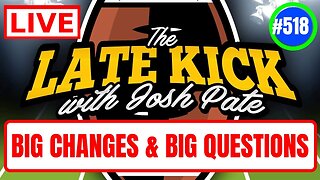Forced Vaccinations on Our Loved Ones: Toms Story *UPDATE*
Pledge here - https://www.crowdjustice.com/case/tom/
Our 'special needs' loved ones cannot make a decision for themselves but we are here....the mothers and fathers and families of these special people.
We have always been here...loving them, caring for them and making the healthcare decisions for them, all of their lives.
So...why can the government take full control of those decisions once your child is 18?
HAPPENING NOW!
My family is one of the many across the country being taken to Court by the Healthcare Authorities to inject our children with an experimental Covid-19 injection against our wishes. This is because they can, just because our children are over the age of 18.
The government can decide what they feel is best for your child and the Courts implement their wishes.
My fight, presently, is for my son who is 22. He has severe learning difficulties but otherwise is a fit and very well young man. He lives with me, his mother. He has had Covid-19 and handled it like the average person and he now has natural immunity and natural antibodies, which is very good news!
This Fight
This fight is for our very precious, special sons and daughters and for all future generations who will ultimately find themselves in the same position.
Tom is a happy adult but has the mental capacity of an 18 month old. He lives alone with his mother who has looked after his every need including his health decisions. He is now being forced to be vaccinated against his mother's wishes and the warnings of many doctors. This cannot be right. No one has suggested she is an unfit mother, that Tom is in dire danger or that his mother's views are unreasonable. Vaccination is being forced on them because there are differing opinions about the vaccine and the Court is choosing and agreeing to enforce the latest government recommendation.
Tom will be injected within days unless the Court agrees to overturn this decision.
Instructed by the solicitors for Tom's mother is leading religious and human rights barrister, Paul Diamond.
Via this campaign, Tom's mother is raising funds for her legal costs incurred to date and to allow her to continue in applications to Court and on appeal. She may have to appeal again up to the Supreme Court because Tom's case is raising a fundamental question:
In the absence of abuse or irrational and unreasonable decision making, what right does the Court or the State have to reach into the family home and override reasonable decisions of parents and family?
Please contribute and share this page now! Please help.
Meet Tom
Tom is 22 and is a very happy and loving young man. He enjoys being with animals, listening to music, looking at books, dancing and being out and about meeting people.
Family is most important to him. He gives joy to all that meet him. He lives off love and is loved so very much.
Tom was born with a chromosome imbalance, partial Trisomy 13, which caused severe learning difficulties and a heart condition being Tetralogy of Fallot. He had full corrective heart surgery at the age of one.
He takes no medications and is a fit and healthy, strong young man.
Getting to this age has exceeded the expectations of the medical profession, which is a credit to his mother. This is the family unit: Tom is the focus of her life and she is the focus of his. She has raised him with love and dedication and has been responsible for all his health decisions including Tom receiving all his childhood vaccinations and the flu vaccine each year. She is no "anti-vaxxer", as the Judge in Court said she might be!
Meet the NHS Authority
During the initial outbreak of the COVID-19 pandemic, the NHS forgot about Tom. He was not placed on any priority list as a vulnerable person, which meant Tom’s mother received no ‘priority shopping’ and could not receive deliveries but had to rely on neighbours. There was also no phone call of concern or an offer of support from Social Services.
But once the Covid-19 vaccination was available, Tom was called to receive it.
After detailed research of medical issues, Tom’s mother was extremely concerned about the vaccination and how it could impact on Tom’s good health, in particular his heart. It is acknowledged in the Healthcare Guidance notes that Myocarditis (heart inflammation) is a side effect of the mRNA Covid-19 vaccination.
As Tom has no speech, he cannot communicate symptoms to his mother, ‘mum my heart is racing, mum I can’t breath properly...’ His mother says she would have to live each day with ‘the not knowing of what could be happening to Tom’.
Having no speech, being unable to explain how he is feeling, would be detrimental to early intervention of medical assistance should it be required. If he had Covid, with flu like symptoms, these would immediately be recognised by his mother.
Tom has previously had Covid-19. A blood test shows that he has natural antibodies/immunity. Tom’s mother is happy for him to receive non invasive medications (which are now available to treat Covid-19) should he become unwell from COVID-19.
When using medication there is an element of control. Medication can be stopped should he have an adverse reaction. Once he has received the mRNA vaccination, however, it is irreversible and there is nothing that can be done.
Despite these concerns, the Medical Authorities (Clinical Commissioning Group) have applied to the Court of Protection for an Order for Tom to have the vaccination against his mother’s wishes.
Meet the Court
The Court’s view is that, although Tom has a mental age of a child and is wholly dependent on his mother to do everything for him, at age 18 he is an adult.
From the age of 18, the mother is no longer considered to be the best person to know what is in her sons ‘best interests’. Instead he is regarded, like any other adult, as having full autonomy - the ability to make his own decision about his body and his medical treatments.
To ensure his autonomy, the Court takes over and decides how he would exercise that autonomy in Tom’s ‘best interests’.
The reality of this, for Tom and anyone like him, becomes that the Court sides with the government authorities. The mother effectively becomes a bystander at the Court.
How does that happen? The Court has reasoned that:
If Tom resists the Covid-19 vaccination that will be evidence that he does not want the mRNA product in his body but, if he does not resist, it is evidence that he wants the mRNA product in his body.
Even though Tom is unable to understand or express any views on the mRNA COVID-19 vaccines, he would want to have the injection for the good of others. This altruism, the Court imagines, would override any consideration that he might have to follow his mothers wishes.
Why the Court is wrong
Tom has had many traditional vaccines under the supervision and care of his mother. To suggest that Tom’s resistance or acceptance of a physical injection indicates his view of its contents is absurd and medieval in its logic.
The ‘altruism’ justification is contrary to established principles of medical ethics that treatment is to be given taking into account the ‘best interests’ of the individual, not the wider community.
Any idea of altruism arises on adopting the government messaging of a positive benefit to others. If the government message was it didn't have that benefit, the altruistic act would be to reject the vaccine as a waste of resources. The Court's justification of altruism strays into saying that whatever the government recommends must be the right thing to do.
Imposing a view of ‘altruism’ provides a means for any Judge to override the strongest and most reasonable of parent's views in order to enforce a government recommendation for injection or other treatment.
The Court chooses to recognise that a young adult may often goes against their parents views, but has not asked what weight a young man, who for 22 years has relied on his mother for everything, including particularly successful health choices, would give to his mother's views.
Parallels with ‘Gillick Competence’
Many people are aware of the legal principle that while parents are responsible for their child’s medical treatments up to the age of 16, if a child under 16 has sufficient understanding then they are able to make serious medical treatment decisions. This is known as ‘Gillick Competence’,
In Gillick, therefore, the Court held that physical age was not the deciding factor, but at what stage the child under consideration moves from being incompetent to competent to give consent. So why does age 18 magically change everything and the issue of whether someone moves from being incompetent to competent suddenly disappear?
Why should a 16th birthday not matter but an 18th birthday does? More practically, why should the government be able to enter her family home on the 18th birthday when the mother remains responsible and competent?
Tom, like many other special needs adults, will never develop that level of competence. Mentally he will always be a child and his mother will always care for him. For the good of society she should surely be encouraged and supported in caring for him whilst she is here and able to do so.
For the lawyers: on the government side, an argument may be made that (a) parents have, in fact, never had any rights or duties in respect of their child once they reached age 18 and (b) the Mental Capacity Act 2005 changed things and made the Court responsible in any event. The mother, however, would argue this is not a correct legal proposition and that if the Act intended this then it would have said so expressly in a clear language.
This complexity of this issue has been hinted at in the highest Courts, but so far has never been fully considered. In the end, the question may simply be asked:
How much or how little justification does the Government of the day need to reach into your home and interfere with your family decisions?
Thank you for taking the time to read this page. This could affect your family, your home. All donations, however small or large, are greatly appreciated. Please share this campaign as widely as you can.
If the immediate applications for appeal against current decisions should not be accepted, Tom’s mother may need to make another application to the Court. Any excess funds after conclusion of any proceedings relating to Tom raised will put towards support for other legal cases fighting for the rights of disabled people and their families in connection with Covid-19 injections.
The above represents the views of the mother and arguments for the appeal expressed for the layperson. Tom is not the real name and any Court decisions will anonymise Tom and his mother.
Artwork - https://www.bobmoran.co.uk
Please consider supporting Bob Moran by buying prints of his artwork
-
 2:16:09
2:16:09
TheSaltyCracker
6 hours agoTrump Takes in $200 Million After Conviction ReeEEeE Stream 06-02-24
107K465 -
 2:49:49
2:49:49
MissesMaam
6 hours agoGrinding Achievement + Perfection | Stardew Valley 💚✨ pt. 34
20.4K6 -
 LIVE
LIVE
Vigilant News Network
12 hours agoMedia Blackout: 10 News Stories They Chose Not to Tell You - Episode 25
3,186 watching -
 3:42:05
3:42:05
EricJohnPizzaArtist
5 hours agoAwesome Sauce with Eric John
24.2K2 -
 3:00:20
3:00:20
vivafrei
17 hours agoEp. 213: SHUTTING DOWN ALEX JONES? Biden Regime War in FULL FORCE! Viva & Barnes Live!
160K279 -
 1:08:34
1:08:34
The Late Kick with Josh Pate
8 hours agoLate Kick Live Ep 518: CFB’s Wildest Era | Biggest 2024 ?s | Impact Freshmen | Bold Predictions
25.1K -
 12:00
12:00
Dr. Eric Berg
1 day agoWhat Exercise Burns the Most Calories?
52.4K22 -
 4:48:29
4:48:29
LumpyPotatoX2
12 hours ago$10,000 PUBG Tournament w/GamersError - #RumbleTakeover
60.9K16 -
 3:22
3:22
One Bite Pizza Reviews
2 days agoBarstool Pizza Review - Marco Pizzeria & Restaurant (Branford, CT)
63.7K25 -
 41:46
41:46
Standpoint with Gabe Groisman
17 hours agoEp. 27. From GameStop to the NBA. Gabe Plotkin
67.4K6